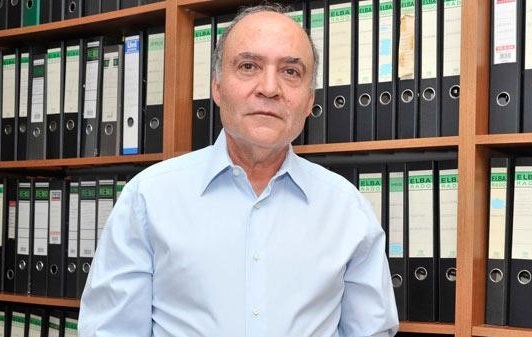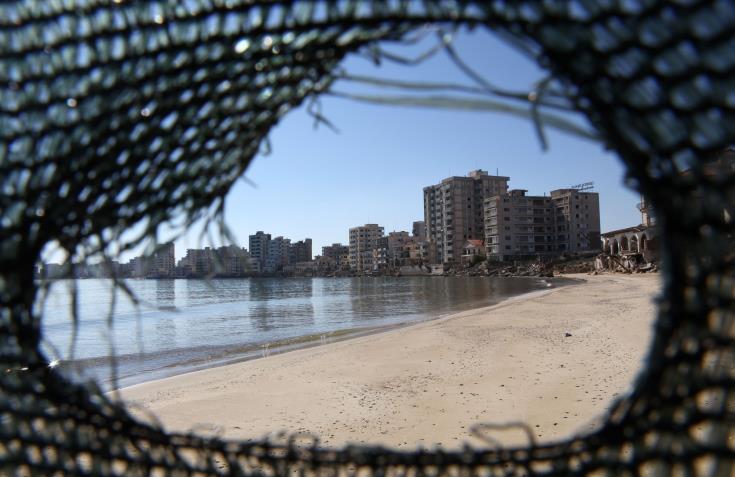
We have no reason to be afraid to go to a new conference
Interview with Toumazos Tsielepis, Member of the Political Bureau of AKEL, Head of Cyprus problem Office of AKEL, International Law expert
Sunday 29 July 2018, “Politis’ newspaper
Does the Turkish side want to resume the procedure?
TT: Analyzing the Turkish side’s statements, and not just those, I believe that, irrespective of positions they have expressed in public, they are probably ready to proceed to a resumption of the procedure. This can be seen if one removes the audacity from their statements – that is the statements declaring that they will not engage in an open-ended procedure, etc., which they always say, but it has never been an obstacle for them to sit in talks. Even more so today, when they know that this specific procedure has a beginning and an ending, because we are talking about a completely crystallized process.
Six themes will be discussed, two on one table (Security – Guarantees and the withdrawal of the Turkish army) and four on the other table (property, territory, effective participation, equal treatment of Greek and Turkish citizens). If there is a conclusion, it means that there is also a strategic understanding, which does not on the one hand signify the solution of the Cyprus problem, but it would greatly facilitate the subsequent course.
We are therefore not talking about an interim solution. There is no such issue. Whether or not there will be a conclusion on a strategic understanding is a matter to be determined in a matter of a few weeks.
Consequently, the position of the Turkish Cypriot side and Turkey in not engaging in endless talks has no real meaning. The procedure will not be endless in any case, and I believe we all realize it because if there is a conclusion on strategic understanding, we are essentially now counting down for the solution, while if there is no conclusion, we will be in an absolute uncertainty regardless of whether and on whom responsibilities will be attributed.
Is the Greek Cypriot side’s position in favour of the abolition of the guarantees and the complete withdrawal of the Turkish army a realistic goal?
TT: Yes, it is a feasible goal. We already have some given facts emanating from Crans Montana. That is to say, the international players on the Cyprus problem appear to have decided that to solve the Cyprus problem, the Greek Cypriots must be fully satisfied on the issue of Security/Guarantees and to a great extent on the issue of territory. And, of course, a compromise will must be reached on the other issues that remain at the second table.
Within this context, everyone at the Crans Montana conference (United Nations, European Union, UK and naturally Greece) expressed the position in favour of the termination of the Guarantees and intervention Rights from day one (of the solution). They have not accepted Turkey’s position for transitional periods. And the only thing that they leave pending is whether there will be a review clause or a sunset clause as regards the stay of the 950 ELDYK[1] contingent of soldiers and 650 soldiers of TURDYK in Cyprus, an issue which is referred to a discussion with the participation of the Prime Ministers as well to be resolved.
So, what do we have as given?
TT: We therefore have as given the international community’s position, as I have outlined it above. And that means, to put it simply, that at a new conference, if Turkey does not accept this position, it will be the one that will have the problem and not us. It also means that with this arrangement we significantly improve Zurich because the great thorn, which is the Treaty of Guarantee, is removed completely from the middle, and the second remains, which is the Treaty of Alliance. But again, in the worst case scenario for us, the Treaty of Alliance will no longer be for an indefinite period of time because whether a review or a sunset of the withdrawal of the 950 Greek troops and the 650 Turks is agreed, that would mean that in essence the Treaty is rendered for a specific period of time. We, naturally, support the latter. All the occupying troops will withdraw – approximately half will leave from the first day (of the solution) and the other half in two years, under the supervision of the United Nations, and not by the Guarantor Powers themselves. We have these positions given.
In what sense do you say we have the international community’s positions as given?
TT: In the sense that they are the positions of the international community itself and Turkey will have a problem if it does not accept them. And Turkey’s problem will be twofold as it has given the impression that it will accept them. By the way that’s the reason why the UN Secretary-General did not apportion responsibilities on Turkey in the Reports he submitted in relation to its stand on specific issues at Crans Montana.
So, we have no reason to be afraid to go to a new conference, unless we do not want to solve the problem. Of course, in order for this to assume a practical form, the other four issues of the internal aspect of the Cyprus problem must also be agreed.
How close and how far are we on the issue of Property, Territory, Effective Participation and Equal Treatment of Greek and Turkish Citizens?
TT: Turkey, according always to the account of the Secretary-General of the United Nations, as this is reflected indirectly, but clearly in his relevant reports, accepts what it has been asked for with regards the issue of Security (Guarantees, the withdrawal of the Turkish army), provided that the remaining four chapters are also agreed. That is, it will accept them as a package. And to be fair, that was the procedure, namely, the six issues are a package.
Consequently, the principal task is to resume the procedure, and in order to do so, the Secretary-General of the UN, through Special Envoy on Cyprus Mrs. Lute, must hear those things he wants – I don’t know if he heard them – which are well-known.
What does Mr. Guterres want to hear?
TT: He wants both in essence and as regards the procedure to hear the following: In relation to the content of the solution, he wishes to maintain the existing convergences, as well as the framework that he has put forward and which includes, among other things, what I have just said previously on the issues of Security/Guarantees and troops. He also includes the informal mechanism which he had submitted on the final night (of the Crans Montana conference), and he refutes the prophets of doom that were saying that he was going to put forward a Treaty of Guarantee with another name. No such a thing was submitted to us. Nor does he assign a role in the Guarantor Powers.
The role is assigned to the United Nations and the European Union, and he wants from a procedural point of view to repeat the conference with the two tables.
That’s is to say, one table on the issues of Security/Guarantees with the guarantors, and on the other table on the four issues we have mentioned, with the two communities. It’s about a package negotiation. That is, the person sitting at one table will logically know what is happening at the other table to determine his/her position.
The Secretary-General of the United Nations, therefore, wants a clear and official reply in relation to these issues, as he tells us in his latest Good Services Report. In any case, if we do not resume the procedure, we must take into account that this time we are probably not going to see Mr. Guterres submitting a neutral report, but a report that will state how and why things cannot move forward, and he will name those who are guilty. The reason he has not explicitly named them so far is because he still has the hope that the procedure will continue.
We say that we need to have a clear picture on the part of Turkey, that it accepts the abolition of the guarantees so that we can consent to a resumption of the procedure.
TT: This is a form of the policy of “protaxis” (Note: the policy of setting “preconditions” that predetermine the results of negotiations). The issue of guarantees and so on will be decided within the conference. The position of the international community there is given, as we also have as given the impression, rightly or wrongly, that Turkey will accept these positions if the other key issues are agreed too.
That is why we should go there to conduct our handling. If we say that if the other side doesn’t accept A and B we won’t go to a conference, then they will also set their own preconditions and terms. Turkey must accept the Guterres proposals on the issues of the guarantees and the withdrawal of the Turkish army, provided that the rest of the issues are agreed at the second table. We shall subsequently move on to discuss the issue of the 950 soldiers of ELDYK and the 650 of TOURDYK.
If we don’t follow this logic and set terms and preconditions, we will lose the game.
Has something changed recently in relation to the way the United Nations, Mr. Guterres, and the international community are treating us?
TT: Yes, something has changed since last year, from the time of Crans Montana and after that. They no longer trust us. They also hear the rhetoric that the President of the Republic has developed all through this period and they are concerned. To be fair, however, lately the public statements by the President, and in particular of the Foreign Minister and the negotiator, have improved significantly.
[1] The Greek Force in Cyprus (ELDYK) is the permanent Greek military force stationed in Cyprus as part of the 1960 Treaties imposed on Cyprus. Turkey has a corresponding force called TOURDYK.




